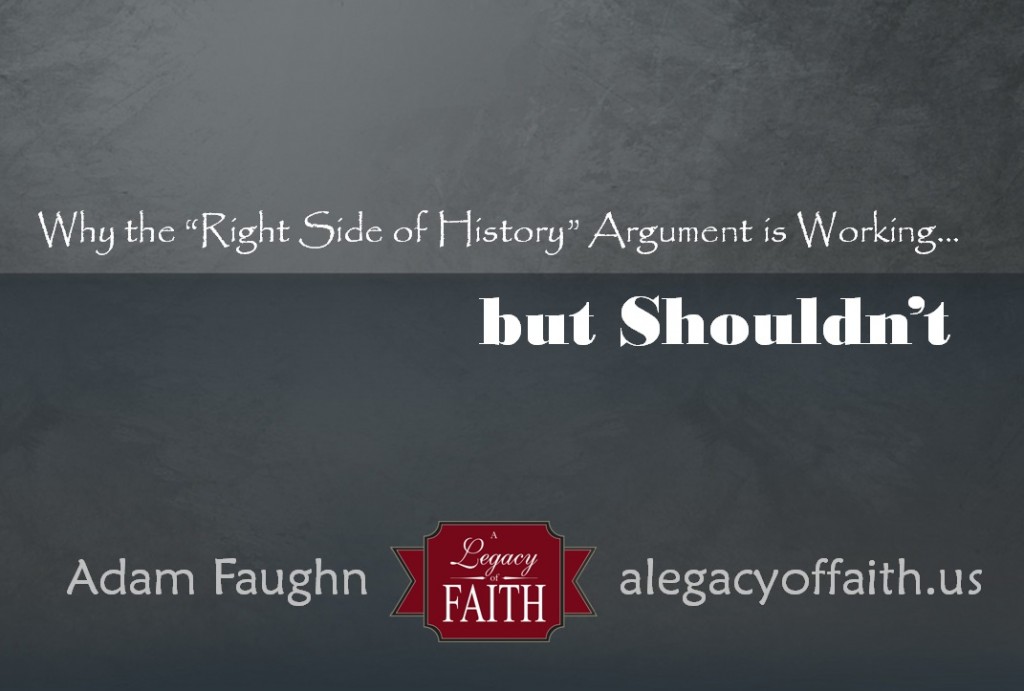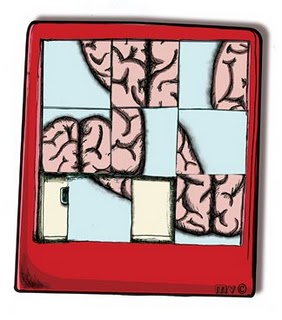Why the “Right Side of History” Argument Works, but Shouldn’t
I have seen it and heard it more times than I care to consider. With the continuing push for homosexual rights, and now the growth of the movement for transgender rights, it is a phrase that has been uttered so much that it has become commonplace.
Especially in the movement for the legalization of homosexual “marriage” (here is why I put that in quotes), this phrase is trumpeted in media, both traditional and social. It is used in court orders and common conversation. It has, in many ways, become the calling card of the movement.
It is that gay marriage (and related issues) are for those on the “right side of history.”
Of course, sometimes you will hear the other side, that those who stand opposed are on the “wrong side of history.”
Some examples:
Former Vice-President Dick Cheyne’s daughter Mary said in late 2013 that her own sister, Liz, who opposes gay “marriage,” was on “the wrong side of history.”
Shepherd Smith of Fox News has said that the Republican Party, in standing against this issue, is on “the wrong side of history.”
Just last week, Wisconsin Governor Scott Walker said that the fight against gay “marriage” was over, due to the Supreme Court of the United States not hearing cases on the issue. Still, he spoke for a ban, and his opponent, Mary Burke, said that he was on “the wrong side of history.”
To say I am tired of this argument would be a grand understatement. Now, to be clear, it has worked. Whether you are for, against, or don’t care about this issue, the “right side of history” argument has, without question, been effective.
Why? In a word, Fear.
If we can tell them that a person is born gay, despite scientific evidence that such is not true (does anyone in the media actually remember the Human Genome Project?), then the comparisons to the civil rights movement become easy. If you are born this way, then who are we to deny you basic rights? History moves toward freedom, so we certainly don’t want to be on the “wrong side” of that, do we?
If we show growing support for an issue, and that support crosses political party lines, then it is just obvious that it is inevitable. Do you want to be the “only one” who doesn’t see this movement in history and end up on the “wrong side?”
Ultimately, if we can get enough people to believe that tolerance means I cannot disagree with anyone about anything (except when they actually stand for something), then we raise a generation–and a society–of wimps. We don’t want to be wrong, and we are too weak to speak out, so we just go along for the tidal-wave-like change, even if we don’t really agree with it. After all, our little psyches might be hurt if we were on “the wrong side.”
Here is what is truly sad, though. It is that this “argument” for gay “marriage” (and related issues) is not really an argument at all. At least, it shouldn’t be.
The same people who are telling us that we are on the “wrong” side of history if we stand opposed to gay “marriage” and they are on the “right” side…
…are the same people who go to our high schools, colleges, universities, and other places touting relative, postmodern truth. In other words, the belief that there is no such thing as “right” and “wrong,” objectively speaking.
So, here you have “experts” (and Twitter trolls) coming out of the woodwork to tell us that we are on the “wrong side of history.” Yet, if you ask them if something is objectively “right” or “wrong,” they would have to answer “no one can know” to stay true to their worldview.
And these are the ones we are listening to?
Now, is it inevitable that gay “marriage” will be legal across our nation, and that in fairly short order? While I cannot know for certain, last week’s cowardly “pass” by the US Supreme Court certainly made it seem that way. Do opinion polls show that I’m probably going to be hated more for writing this post and continually putting “marriage” in quotation marks in reference to those who would want homosexual unions? No doubt that is true.
In other words, is the pro-gay “marriage” agenda winning the day in our culture? There is no way to miss that they are.
But all Christians need to remember: it is not about winning the day. It is not about winning an argument on one issue (though issues are important). The Christian religion has, certainly, never been about being on top of the polls or making sure the celebrity or political culture is at our beck and call.
It also is not about being on the “right side of history.”
Instead, it has always been about being in the right hand of Jesus in judgment.
 To Receive Every Post via Email for Free, Click Here
To Receive Every Post via Email for Free, Click Here



